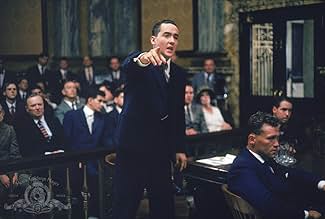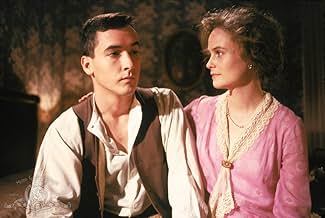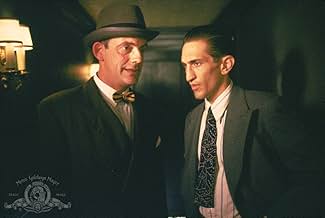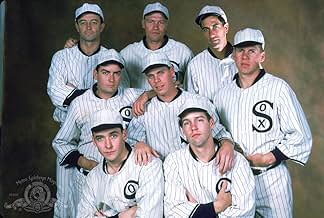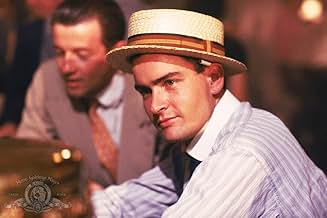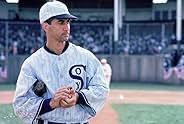A dramatization of the Black Sox scandal when the underpaid Chicago White Sox accepted bribes to deliberately lose the 1919 World Series.A dramatization of the Black Sox scandal when the underpaid Chicago White Sox accepted bribes to deliberately lose the 1919 World Series.A dramatization of the Black Sox scandal when the underpaid Chicago White Sox accepted bribes to deliberately lose the 1919 World Series.
- Awards
- 2 nominations
- Smitty - The Writers
- (as Jim Desmond)
- Director
- Writers
- All cast & crew
- Production, box office & more at IMDbPro
Storyline
Did you know
- TriviaIn many scenes, players toss their gloves down on the field near their positions before they head to the dugout. Until the 1950s, players frequently left their gloves on the field while at bat. Because of the danger of players stepping on or tripping on them, and batted or thrown balls bouncing off them in odd directions, Major League Baseball requested, then demanded, players to take their gloves with them to the dugout. They finally complied after a rule change and fines.
- GoofsShoeless Joe Jackson signs his confession with an "X". Jackson was illiterate, but he could sign his name by mimicking a pattern. Autographed baseballs and photographs from the time prove it.
- Quotes
Buck Weaver: I still get such a bang out of it. Playin' ball. Same as I did when I first come up. You get out there, and the stands are full, and everybody's cheerin'. It's like everybody in the world come to see you. Inside that, there's the players, and they're yakkin' it up. The pitcher throws, and you look for that pill, and suddenly, there's nothin' else in the ballpark but you and it. Sometimes, when you're feelin' right, there's a groove there, and the bat just eases into it and meets that ball. And when that bat meets that ball, and you can just feel that ball just give, and you know it's gonna go a long way, damn, if you don't feel like you're gonna live forever. I couldn't give that up. Not for nothin'.
- Crazy creditsThe opening credits are done against a cloudy blue sky, first going up, then to the right, and down to the bottom (kind of like a fly ball). Despite the ensemble cast, the most well-known leading and character actors at the time are credited first in alphabetical order, then lesser known actors that had roles that were just as large or larger are credited in pairs of two. Example: John Cusack, Christopher Lloyd, and Charlie Sheen are credited first, due to their successes with The Sure Thing (1985), Back to the Future (1985), and Platoon (1986), respectively; however, in pairs, Michael Rooker, Kevin Tighe, and Richard Edson also had pivotal roles, but were lesser known. Sheen already was well-established but had only a few minutes of screen time in the movie, Lloyd and Edson always are together, playing gamblers, but Lloyd was a much more well-known actor and credited first.
- Alternate versionsFive seconds were cut from the British theatrical release in order to obtain a "PG" rating by removing a use of strong language. The film was later released uncut on video and the rating was upgraded to "15", which was subsequently downgraded to "12" for the DVD.
- SoundtracksI'm Forever Blowing Bubbles
Written by Jaan Kenbrovin (as Jann Kenbrovin) and John W. Kellette (as John William Kellette)
Published by Warner Bros. Music, a division of Warner Bros. Inc.
Used by permission. All rights reserved.
But it's all the cynical wheeling and dealing behind the Black Sox scandal which make the film so fascinating. The story might have been unbelievable if it wasn't entirely true, but like any aspect of real life the details are messy and inconclusive. Most of the film recounts the mechanics of the fix; events during the subsequent exposure and trial are telescoped too quickly into the final forty minutes or so, which makes sense: in any conspiracy the crime is always more interesting than the punishment.
It helps to be at least slightly familiar with the huge cast of characters involved: players, gamblers, reporters and so forth. A few scenes have been added for dramatic unity, and others were abbreviated to maintain a consistent pace, but all the facts are there, and Sayles manages to pull them all together in an entertaining history lesson from our collective adolescence, re-creating that fateful moment when the boys of summer grew up for good.
- How long is Eight Men Out?Powered by Alexa
Details
Box office
- Budget
- $6,100,000 (estimated)
- Gross US & Canada
- $5,680,515
- Opening weekend US & Canada
- $1,129,491
- Sep 5, 1988
- Gross worldwide
- $5,680,515
Contribute to this page





